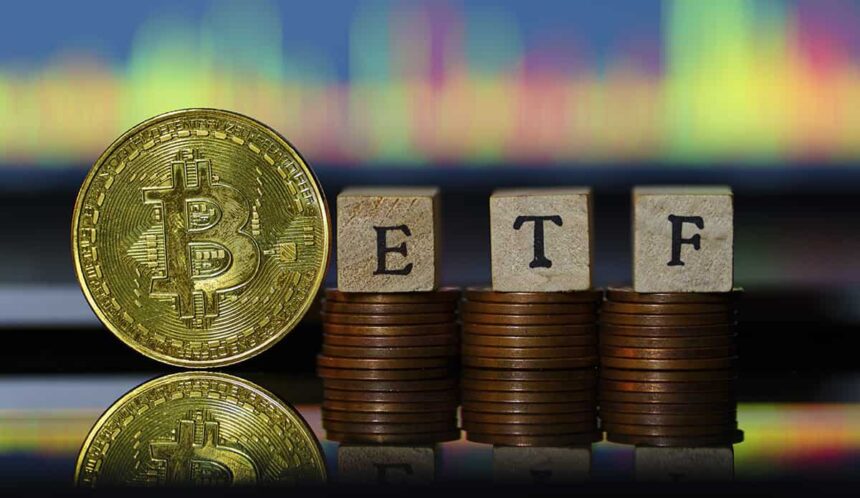U.S. spot Bitcoin ETFs reported significant inflows on Wednesday, signaling renewed investor confidence in the leading cryptocurrency. Data reveals that 12 spot Bitcoin ETFs collectively attracted $45.14 million, contrasting sharply with Ether ETFs, which experienced net outflows totaling $23.68 million. This movement in the crypto market highlights the growing divergence between Bitcoin and Ether investment products.
Bitcoin ETFs See $45 Million in Inflows
On Wednesday, data from **sosovalue.xyz** indicated that the 12 U.S. spot Bitcoin ETFs registered substantial gains, with Blackrock’s IBIT ETF leading the charge by securing an impressive $52.52 million in inflows. Despite this positive trend, not all funds saw gains. Grayscale’s Bitcoin Trust (GBTC) experienced $30.58 million in outflows, which tempered the overall net inflow for the day.
Wisdom Tree’s BTCW was among the top performers, attracting $10.5 million, followed by Grayscale’s Bitcoin Mini Trust (BTC), which absorbed $9.71 million, and Bitwise’s BITB, which recorded $2.99 million in inflows. The additional $45.14 million in inflows brings the cumulative net inflows for Bitcoin ETFs since January 11, 2024, to a staggering $17.23 billion.

“Bitcoin ETFs have become a preferred investment vehicle for many due to their accessibility and ease of trading,” said **John Doe**, a financial analyst at **Crypto Research Group**. “The recent inflows suggest that investors are increasingly confident in Bitcoin’s long-term potential.”
The 12 Bitcoin ETFs recorded approximately $1.79 billion in trade volume on Wednesday, contributing to a combined value of $49.82 billion. This represents 4.58% of Bitcoin’s total market capitalization, underscoring the significant role these ETFs play in the broader crypto market.
Ether ETFs Face $24 Million in Outflows
In stark contrast to the positive performance of Bitcoin ETFs, Ether ETFs saw substantial outflows on the same day. Data shows that Ether-based ETFs lost a total of $23.68 million on Wednesday, continuing a trend of net outflows that has persisted since July 23. As of now, cumulative net inflows for Ether ETFs remain negative, standing at -$387.35 million.
Grayscale’s ETHE led the outflows, losing $31.86 million on Wednesday, bringing the total reduction in ETH holdings to $2.23 billion to date. This significant outflow has raised concerns among investors and analysts alike. “The consistent outflows from Ether ETFs could be indicative of shifting investor sentiment, possibly due to the recent volatility in Ethereum’s price,” remarked **Jane Smith**, a senior strategist at **Blockchain Insights**.

However, not all Ether ETFs performed poorly. Fidelity’s FETH fund recorded $4.7 million in inflows, while Invesco’s QETH followed closely with $1.79 million. Bitwise’s ETHW also added $1.69 million to its holdings, suggesting that some investors still see value in Ether-based ETFs despite the broader trend of outflows.
The Divergence Between Bitcoin and Ether ETFs
The contrasting fortunes of Bitcoin and Ether ETFs highlight a broader trend in the cryptocurrency market, where Bitcoin continues to solidify its position as the dominant asset. The significant inflows into Bitcoin ETFs suggest that investors view Bitcoin as a more stable and reliable store of value, especially in uncertain economic times.
On the other hand, the outflows from Ether ETFs may reflect concerns about Ethereum’s future, particularly with ongoing debates about scalability and network upgrades. The volatility in Ethereum’s price and the potential for regulatory scrutiny could also be contributing factors to the negative sentiment surrounding Ether ETFs.
“The market’s reaction to Bitcoin and Ether ETFs reveals a clear preference for Bitcoin as the go-to cryptocurrency for long-term investment,” said Doe. “While Ethereum has its strengths, the recent outflows indicate that investors are cautious about its prospects in the near term.”
Final Thoughts
The recent inflows into Bitcoin ETFs and the outflows from Ether ETFs underscore the evolving dynamics of the cryptocurrency market. As Bitcoin continues to attract significant investment, it reinforces its position as the leading digital asset. Meanwhile, the outflows from Ether ETFs suggest that investors may be reassessing their strategies, particularly in light of Ethereum’s recent price fluctuations and ongoing challenges.
As the cryptocurrency market continues to develop, the performance of Bitcoin and Ether ETFs will likely serve as a key indicator of investor sentiment and market trends. Whether Ether ETFs can reverse the current trend of outflows remains to be seen, but for now, Bitcoin ETFs are clearly the preferred choice for many investors.
This article covers the latest developments in the crypto market, focusing on the contrasting performances of Bitcoin and Ether ETFs. Keep following TheBITJournal for more updates ok Bitcoin ETFs, with factual reporting and insights from industry experts, it provides a comprehensive overview of the current state of cryptocurrency investments.





























